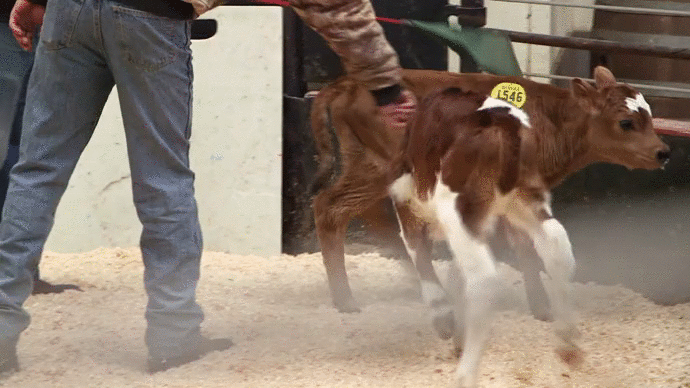Amid drought, California ranchers say a bitter farewell to cattle

Frank Imhof inherited his ranch from his father, who inherited it from his. His cattle breed’s line also goes back that far. But Imhof may now have to sell all or most of the herd that provided his family livelihood for three generations.
“I keep on saying in two weeks things are going to change,” Imhof told America Tonight. “It’s going to rain more. The grass is going to start growing more. But it isn’t.”
Never in Imhof’s lifetime, and never in recorded history, has California seen so little water over a 12-month period. The soil soaked up an average of about seven inches across the state, 15 inches below normal. It’s not enough for the cattle to drink, let alone grow the grain needed to feed them. Imhof expects to cut 40 to 60 cows in the next month and a half.
He gestured to a creek.
“We call it a creek,” said Imhof. “It used to be a river. Should be 15 feet higher than it is now.”
The auction block
At a weekly cattle auction in Aromas earlier this month, trucks filled the parking lot one by one. Normally, at this time of year, 200 head of cattle would be up for sale. On this winter day, more than 1,000 hit the auction block. And nearly all are headed out of drought-blighted California. An overhead webcam lets cattlemen from around the country check out the cattle up for sale and place bids over the Internet.
The drought has driven hundreds of ranchers to the brink, according to auctioneer and owner Jim Warren.
“The really sad part is that a lot of people have put a lot of effort and energy and time over the last 20 years to produce a high quality product,” he explained. “And when they sell their cows, they have to start over basically again.”
Janet Burback brought three truckloads of cattle, 20 in all.
“One of the cows stuck her ear out of the trailer side and I saw the ear number and the ear. And that’s it, I lost it,” she said. “And all the way down, I bawled my head off. I dumped them off and bawled by head all the way back to Morgan Hill.”
For some ranchers, things are so dire that they are selling tiny calves, barely weaned off their mother’s milk. It’s not clear if they’ll survive.
“Nobody has a choice,” said Burback. “We have to get rid of ‘em. We can’t afford to keep ‘em there.”

Mid-March will be the moment of reckoning for Harry Serafin, who’s been trying to hang on to the business that’s he’s built up over 52 years.
“Then we’ll have to make a real big decision and they’ll maybe all have to go,” he said. “And, and maybe all have to go.”
Down the road from the Aromas Auction House sits 101 Livestock Supply, which sells vaccines, ear tags, fly spray and wormers. Owner Chris Avery is bracing too.
“Well, if they sell their cows,” he said, “they’re not going to buy any of that stuff.”
Make it rain
Six hundred miles away in the Imperial Valley, a meat packing plant is on the verge of shuttering. By April, 1,300 people will lose their jobs in a county that already has the highest unemployment rate in California, a state with one of the highest unemployment rates in the nation.
Don Campbell, the mayor of Brawley, called the impact “tremendous” and “devastating.”
“These are people we know personally, neighbors,” he said. “My very next door neighbor works for National Beef, and he’s the sole provider for his family, with a couple of young kids.”
One of the state’s leading banks predicts the drought will cost California 40,000 jobs, more than half of them in agriculture.
And it all comes down to feeding the cattle.
“I farm 200 acres of hay and it hasn’t come out of the ground,” explained Bob Wood, who’s been trimming his cattle a few head at a time. “And I’ve sold half my herd and used the money to buy hay.”
That hay comes from faraway farms, sometimes shipped from Oregon and Utah. Imhof says his hay was transported 900 miles. And given the scarce supply, the cost has skyrocketed.
California’s governor declared a drought emergency, meaning ranchers can qualify for low-interest loans to buy that expensive feed. But Imhoff says most farmers don’t want to be deeper in debt. He wants the government to think bigger.
“I mean, I’m just a farmer. I don’t know,” he said. “But you look up in these clouds and you go, ‘God, couldn’t someone kind of make it rain? I mean, you can do everything else. We can go to the moon. We can go to Mars. We can do all this stuff and spend all these billions of dollars, trying to save a fish down a creek, letting water out of a trillion-dollar dam. But we can’t make it rain.”
Error
Sorry, your comment was not saved due to a technical problem. Please try again later or using a different browser.